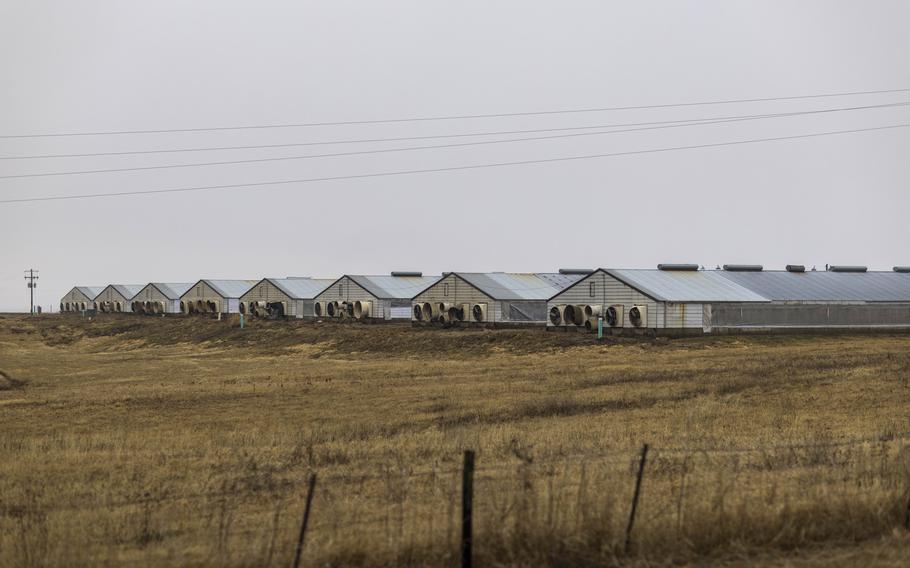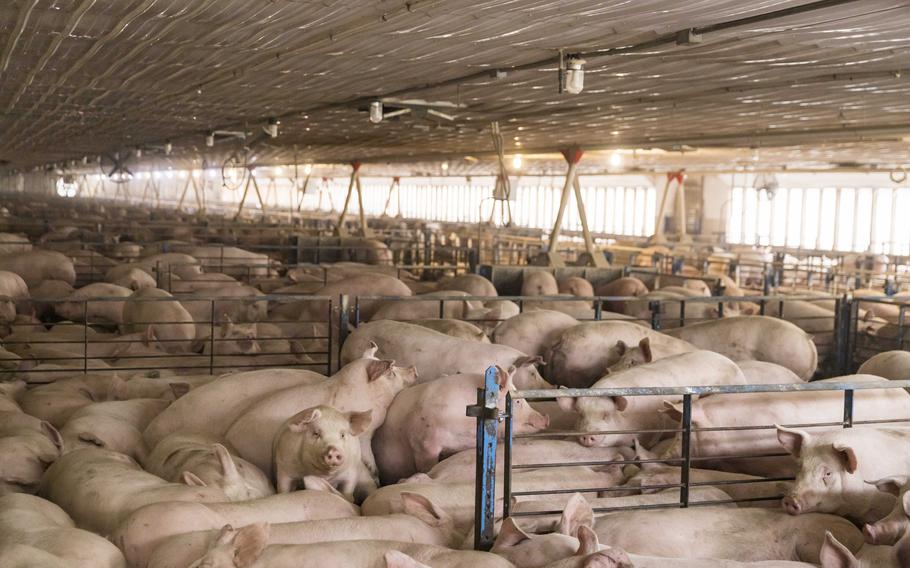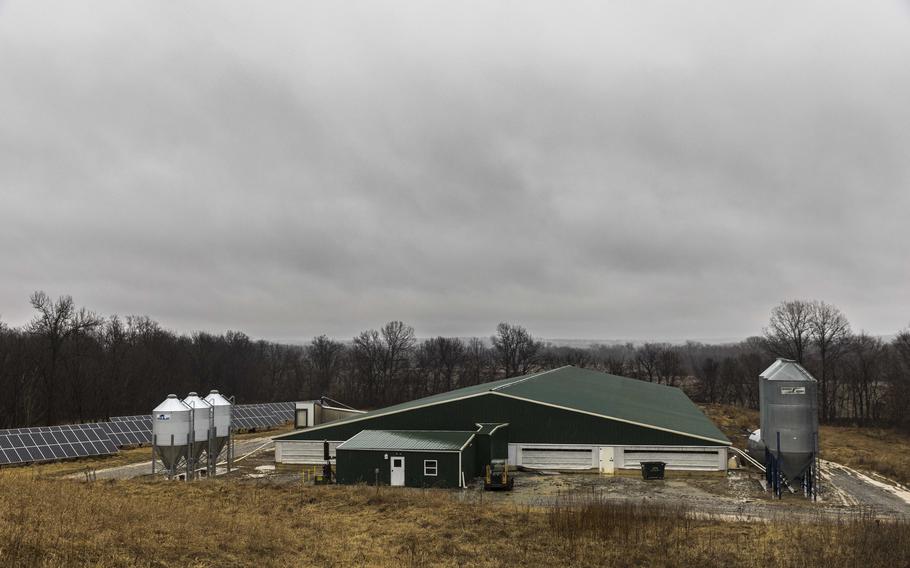
A hog farm in Unionville, Mo., owned by Smithfield Foods, which was acquired in 2013 by a Chinese company. (Kathryn Gamble/The Washington Post)
UNIONVILLE, Mo. — With brown winter grass framing its low-slung buildings, the hilltop hog farm a few miles outside of town looks pretty much the same as countless other sites spread across the pork belt. But this one is owned by a Chinese company, and to some people, that makes all the difference.
The recent appearance in the Missouri skies of what President Biden called a Chinese spy balloon has only underscored popular misgivings about Beijing's intentions. In the airship's wake, the cross currents buffeting U.S.-China ties show how a profound lack of trust is swamping commercial links that once were seen as mutually beneficial.
Mushrooming anti-China sentiment also means fresh scrutiny for the owner of this farm, Smithfield Foods, which was acquired in 2013 by a Chinese company, WH Group. Now, as lawmakers jockey to demonstrate their toughness toward China, Smithfield executives are exasperated by suggestions that Chinese ownership of American land threatens the United States.
"I don't have anybody from China directing what I'm doing," said Kraig Westerbeek, a Smithfield vice president. "I don't view this business as being owned by the Chinese government. I don't even understand the conversation, quite frankly."
With relations between the United States and China near a 40-year low, Chinese ownership of American farmland has suddenly flared into controversy. Twenty-seven states, including Missouri, are considering proposals that would ban or restrict foreign acquisitions of agricultural land. Congress may require future sales to be cleared by a government investment committee.
The furor is striking, considering China's modest holdings. Chinese entities own fewer than 3 out of every 10,000 acres of privately held American land, according to U.S. Agriculture Department figures. Tiny Luxembourg owns more.
But lawmakers say the Chinese government could use future deals, including by private companies, to conduct espionage or imperil the nation's food supply. The town of Grand Forks, N.D., in February dropped its support for allowing a Chinese company to build a corn milling plant on land it had purchased 12 miles from a U.S. military base, after the Air Force said the project posed "a significant threat to national security."
While Chinese land purchases have risen since 2019, they remain below those of Canada, the Netherlands, Italy, the United Kingdom, Germany, and at least nine other countries, according to the Congressional Research Service. Total U.S. holdings by all foreign owners amount to more than 40 million acres, an area that is larger than Iowa and has grown 16 percent in two years.
Beijing shows little sign of an imminent spending spree: China's annual investment in all U.S. industries plunged by more than 90 percent since peaking at $49 billion in 2016, according to the Rhodium Group, a New York-based consultancy.
"I just can't get excited over this subject," said Dennis Wilder, a former Central Intelligence Agency analyst who advised President George W. Bush on China policy. "They're going to control our food supply? With 1 percent of the land, we're not talking about that capability."
Against this backdrop, urgent calls for a ban on Chinese land deals seem important mostly as a sign of the deterioration in U.S.-China relations. Just three years ago, President Donald Trump celebrated a trade deal that committed Beijing to double its purchases of American farm products.
Today, China is celebrated as American farmers' top foreign customer yet reviled as an ill-intentioned adversary.
The proposed restrictions on Chinese land purchases also reflect growing suspicion of Chinese President Xi Jinping. His domestic repression and foreign assertiveness have damaged China's international standing while his embrace of greater state control over the economy has blurred the line between China's private sector companies and the government.

The pork that Smithfield ships to China is largely hog parts that are shunned by American diners, such as animal feet and tongues. (Kathryn Gamble/The Washington Post)
"Is there such a thing as a private company in China? I'm not sure there is," Rep. Mike Gallagher (R-Wis.), chairman of the House select committee on China, said in a recent interview.
Yet if many politicians see only danger in China ties, the view on the ground is more nuanced. Smithfield is one of the largest economic actors across a broad swathe of rural Missouri, employing about 2,800 people and contracting with 110 family-owned farms.
Its 2013 acquisition by W.H. Group — then known as Shuanghui International — drew fire from some American politicians who feared it would mean higher costs for consumers. But the Chinese buyer said it wanted a reliable pork supply to meet the needs of a growing middle class in China. And Shuanghui was far from the first foreign player in the U.S. food industry. After a three-month review, the interagency Committee on Foreign Investment in the United States (CFIUS) approved the deal.
W.H. Group is a publicly traded company on the Hong Kong Stock Exchange, meaning its executives have an obligation to maximize the profits that drive stock values higher. Since the Chinese takeover, Smithfield's revenue has grown by more than one-third to $17.6 billion. Its 40,000-worker payroll is up from 37,000 a decade ago. The company's headquarters remain in Smithfield, Va., where it has been since 1936.
While critics said the takeover threatened the U.S. food supply, the pork that Smithfield ships to China is largely hog parts that are shunned by American diners, such as animal feet and tongues. And unlike the North Dakota example, the nearest military base is more than 100 miles from Unionville.
Smithfield's operations today also are little changed from when it was U.S.-owned, leaving local people to balance the shadowy prospect of an unspecified threat against the tangible benefits of the company's presence.
"You can mention China to most people and it's not going to go down well," said Charley Bill Pittman, Unionville's mayor. "But it has been nothing but an asset, economy-wise."
The Unionville farm operates an innovative system that converts methane from hog manure into natural gas. Up to 72,000 hogs are confined here in dozens of low, white structures. The swine waste falls through the floor boards, eventually flowing into nearby covered lagoons.
As the manure decomposes, it releases methane, which is captured and purified before being piped to utility customers. The system produces enough energy to power 14,000 average homes for a year.
"It's not a science project. It's a commercially viable business," said Westerbeek, who manages the company's renewables joint venture.
Smithfield has several other facilities in Missouri, including a slaughterhouse in Milan, and is a familiar presence in many small towns. The company since 2020 has spent $47 million upgrading its state facilities.

Whitworth supplies the pork producer with lubricants, equipment and fertilizer while raising his own hogs and cattle in Worthington. MUST CREDIT: Photo for The Washington Post by Kathryn Gamble. (Kathryn Gamble/The Washington Post)
Scott Whitworth, 55, a farmer in Worthington, a nearby village of about 50 people, has been doing business with the company for roughly 20 years. He runs his affairs from a one-story former schoolhouse that was built by the Depression-era Works Progress Administration (WPA).
Whitworth supplies the pork producer with lubricants, equipment and fertilizer while raising his own hogs and cattle. He still deals with the same Smithfield representative that he did before the Chinese took over. If anything happened to Smithfield, he said, it would "just devastate" the local economy.
"I don't much like foreign ownership. But it is just the way of the world now," said Whitworth, who has been farming since he was 12. "I would way rather Americans owned it. But these guys are good neighbors. They're good for the community."
In Missouri, foreign ownership of farms has long been a political flash point. State law limits total foreign ownership to 1 percent of agricultural acreage. In the state's U.S. Senate race last year, Democrat Trudy Busch Valentine blasted Republican Eric Schmitt for voting in 2013 to relax ownership limits, a move that allowed W.H. Group to acquire Smithfield's 130,000 Missouri acres.
Likewise, a political action committee backing Josh Hawley for state attorney general in 2016 ran a television ad depicting a sinister-looking Chinese business executive triumphantly visiting his Missouri farms, entitled "Stop Helping the Chinese Buy Our Farms."
In Jefferson City, the state capital, at least nine proposals to restrict or prohibit foreign ownership are moving through the General Assembly.
State Sen. Bill Eigel (R) has proposed a flat ban on foreign purchases of real estate, including agricultural land. He also worries about the influence in Missouri of the World Economic Forum, the Swiss nonprofit that is a bête noire of antiglobalist forces.
"Every acre that is owned by a foreign entity takes a little bit of our sovereignty as a country," Eigel said. "We don't need any foreign owners to come in and take control of our farmland."
Still, even some China hawks say Chinese land purchases are too small to matter. Derek Scissors, a China expert at the right-of-center American Enterprise Institute, said lawmakers instead should be addressing the U.S. dependence on China for animal feed ingredients, including vitamins.
"If we're not prepared and China cuts us off, how quickly could we reconstitute production?" Scissors asked. "That is potentially a point of serious vulnerability."
The state's farm groups are split on the land ownership issue.
The Missouri Farm Bureau said it supports reducing the 1 percent cap, saying "food security is national security." A farm bureau spokesman did not respond to requests to elaborate.
At February's Missouri Pork Expo, an annual trade show held in the resort community Lake of the Ozarks, members of the state's pork association had other things on their minds: the lingering effects of last year's drought; inflation; worker shortages; and the threat of African swine fever.
"China owning Smithfield and whatever land they've got — it don't amount to anything," said Phil Howerton, 71, who raises hogs about 65 miles southeast of Kansas City. "It's pretty easy to be against it, if you don't have land for sale."
Over a lunch of barbecue pork, and while downing Bud Lights at happy hour, several attendees emphasized their reliance on foreign markets. Exports of agricultural products to China last year set a record at $36 billion, according to the USDA.
Farmer Scott Hays, 55, said he was "very nervous" about the U.S.-China relationship. For years, American farmers have supplied China with soybeans, corn, beef and pork while Chinese factories filled the shelves of Walmart and Target with affordable clothes and electronics, he said.
"It's unfortunate we've got ourselves in this situation of distrust," he said. "I don't trust them either. But gosh dang, we've got more that we could work together on than fight over. The common man in both countries won't do well if we keep going in this direction."